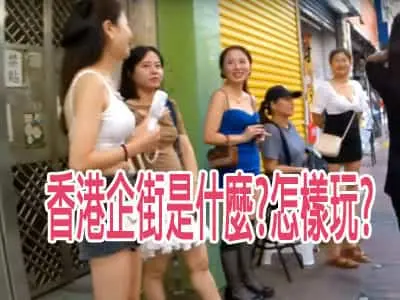Table of contents
What is Qijie?
In Hong Kong,Qijie"Nannan" refers to sex workers who openly solicit customers on the street, usually standing or walking in specific neighborhoods to find clients. This phenomenon is more common in some areas of Hong Kong, such as KowloonTemple Street, Portland Street, Mong Kok, and Fuk Wah Street, Sham Shui Po.
The term "standing on the street" comes from Cantonese and refers to the act of standing at a specific location on the street, waiting for customers to provide sexual services in exchange for payment. These girls are mainly active in some specific areas of Hong Kong, such as certain streets or alleys in Yau Ma Tei, Mong Kok, Sham Shui Po, Tsim Sha Tsui, etc. They typically work individually or in small groups, negotiating prices and services directly with customers. This working model is different from "indoor prostitutes" who engage in sex work in fixed places (such as bars, massage parlors or nightclubs). Street prostitutes face greater social pressure and legal risks due to their public nature.

Background of Qijie Nannan
Hong Kong has a long history of sex work. As early as the early days of the port, there was a public prostitution system in the Shek Tong Tsui area, and brothels were concentrated there. It gradually declined after the public prostitution system was abolished in the 1920s. In the 1960s, during the Vietnam War, Hong Kong served as a resting place for American troops. The area around Lockhart Road in Wan Chai became an active area for sex trade due to its numerous bars, laying the foundation for Hong Kong's sex industry. As times change, sex work has become more diverse, with working on the street becoming one of the more prominent models.
Most of the girls on the street include locals and immigrants from the mainland or other regions. They choose to work in the business world for a variety of reasons. Some do so because of financial pressure and cannot afford the high cost of living; others enter this industry due to lack of other skills or employment opportunities. In addition, some girls may be Mainlanders who come to Hong Kong for a short period of time, trying to earn income quickly in Hong Kong. Their ages range widely, from young women to middle-aged women, and their work motivations range from making a living to pursuing higher income.

How to play Qijie Girls?
Location and identification: Street girls often appear in popular night market areas such as Temple Street and Portland Street. They usually attract attention with more conspicuous clothing or behavior, and may actively interact with passers-by and talk. Clients usually approach sex workers on their own to negotiate services and prices.
Generally speaking, after clients come into contact with girls on the street, they will go to a nearby hotel or rented room for sexual intercourse. Prices and service details vary from person to person, and participants should ensure the safety of their property and personal belongings.

Legal framework and enforcement
In Hong Kong, sex work itself is legal, but related activities are strictly regulated. Under Hong Kong law, it is not illegal for individuals to engage in sex trade, but it is illegal to control sex workers, organize prostitution activities or run a brothel. This legal framework is similar to that in the UK and is designed to protect sex workers' autonomy while combating exploitation. Street sex workers usually work in their own capacity to avoid violating the law of "controlling the prostitution of others". However, the Police occasionally conduct anti-prostitution operations in hotspots such as Temple Street or Portland Street to arrest foreign sex workers suspected of violating their stay conditions or related crimes.
This legal environment has a dual impact on street sex workers. On the one hand, they can work legally without relying on illegal organizations; on the other hand, street activities are likely to attract police attention, increasing the risk of arrest or harassment. In addition, Hong Kong has not established a statutory red-light district, and street protests may trigger complaints from residents in some areas, further increasing the pressure on law enforcement.

Work environment and challenges
Street girls usually hang out at night or during busy hours, choosing busy areas such as Temple Street or Portland Street, where night markets, restaurants or entertainment venues attract a large crowd and are easy to attract customers. However, the environment of street work is challenging. First, open solicitation presents safety risks, including violence or robbery by patrons. Secondly, street girls have to face social stigma. Many people have negative stereotypes about them, calling them "chicken” or “Northern girl” and other derogatory terms. This discrimination may affect their mental health.
In addition, business owners lack labor protection. Unlike workers in other industries, they do not have access to health insurance, pensions or labor rights, and due to the sensitive nature of their work, they find it difficult to seek legal or social support. Some girls may find it difficult to integrate into mainstream society due to language barriers or identity issues, further exacerbating their marginalized situation.

Social impact and controversy
The existence of street girls has caused controversy in Hong Kong society. On the one hand, some residents believe that street sex trade affects the city appearance and community safety, especially in popular tourist areas such as Temple Street, where residents and merchants often complain that sex workers occupy public spaces or bring adverse effects. On the other hand, groups supporting the legalization of sex work, such asBluebird (AFRO), arguing that "sex work is work", emphasizing that sex workers should enjoy the same rights as other workers, and calling for decriminalization to reduce their oppression. Organizations such as Bluebird provide hotline services to encourage sex workers and the public to discuss legal reforms and promote understanding and support for sex work.
In addition, the existence of street girls also reflects the economic and social problems of Hong Kong. The high cost of living, the widening gap between the rich and the poor, and the lack of education and employment opportunities for grassroots workers may all push some people into the sex industry. While organizations such as the Neighborhood Workers Service Center (NWSC) focus on grassroots labor rights, their retraining programs indirectly respond to these issues by attempting to provide alternative employment pathways for low-skilled workers.

Support and Future Outlook
Currently, there are some non-governmental organizations in Hong Kong that provide support to sex workers, such as the 24-hour hotline of Bluebird.2770-1002), providing legal advice, psychological support and safety recommendations to sex workers. These organizations emphasize decriminalization reforms, arguing that although current laws allow individual sex work, restrictions on related activities still put sex workers in a precarious position. Internationally, the red-light district model in the Netherlands and other places is seen by some as an experience worth learning from, but Hong Kong's land restrictions and cultural background make this model difficult to implement.
In the future, the issue of sex work in Hong Kong may need more public discussion. Decriminalization, improving working conditions, providing social security, and reducing stigma against sex workers are all potential reform directions. At the same time, the government and society need to face up to the economic and social factors behind sex workers and reduce the possibility of people entering the sex industry due to economic pressure through improvements in education, employment opportunities and social welfare.

in conclusion
Prostitutes in Hong Kong are a visible part of the sex industry, working within a legal but restricted legal framework and facing multiple challenges in terms of safety, social stigma and law enforcement pressure. Although sex work is legal in Hong Kong, the illegality of manipulating and organizing sex trade makes working on the street a high-risk option. Society's attitude towards sex work is divided, with supporters calling for decriminalization and protection of rights, while opponents are concerned about its impact on the community. Through more comprehensive social support and policy reforms, Hong Kong may be able to balance the needs of the community and the public while protecting the rights of sex workers.
Further reading:




